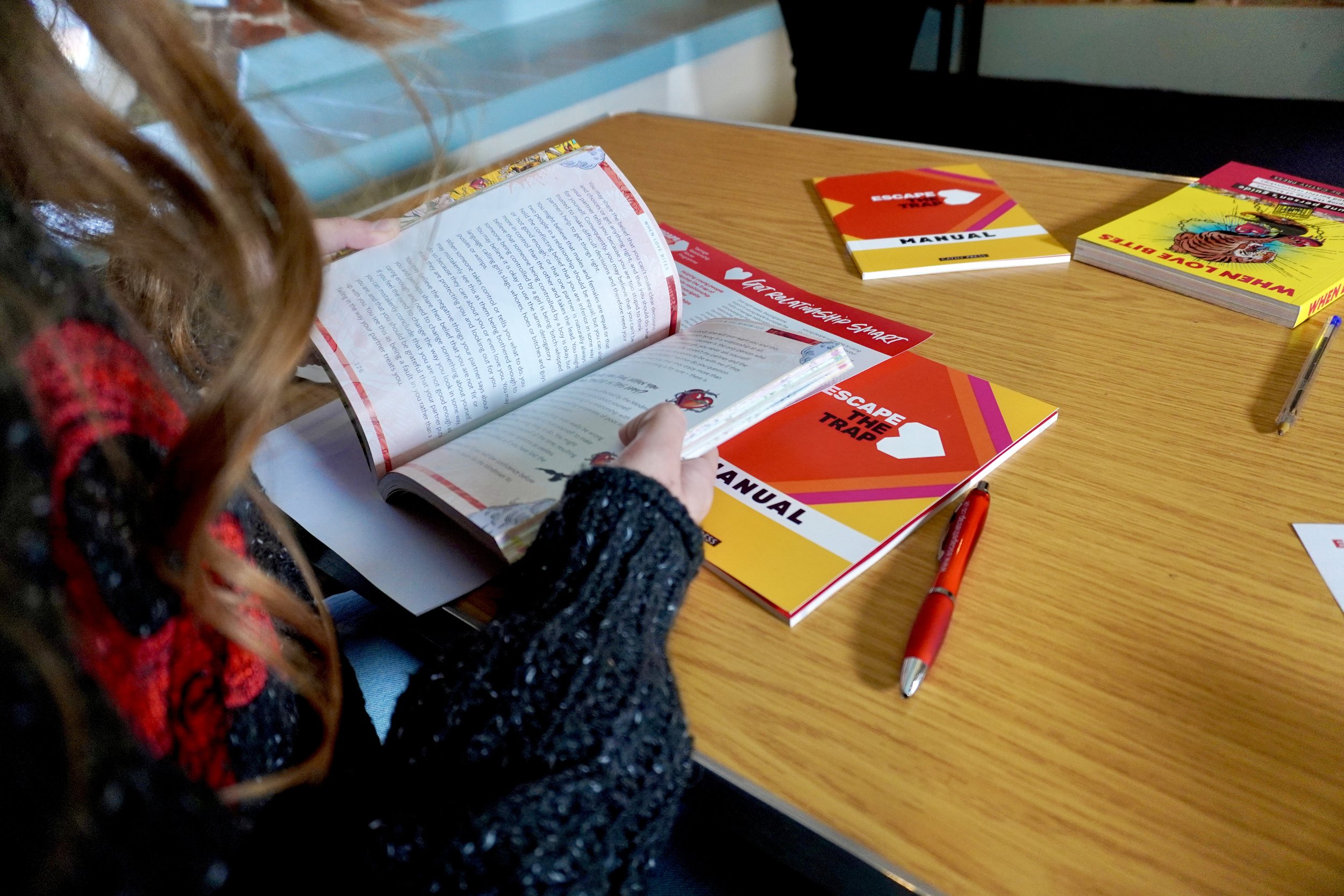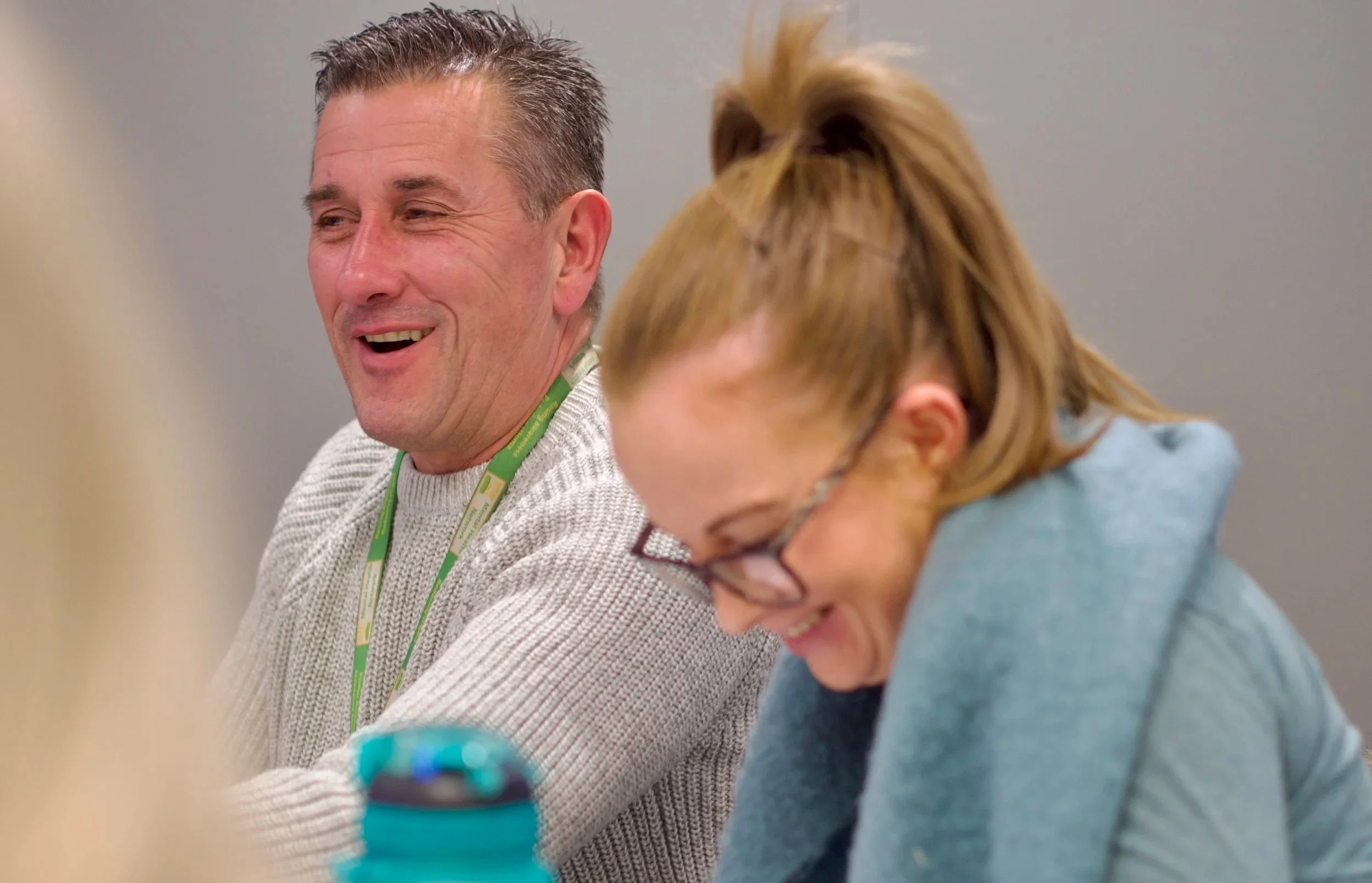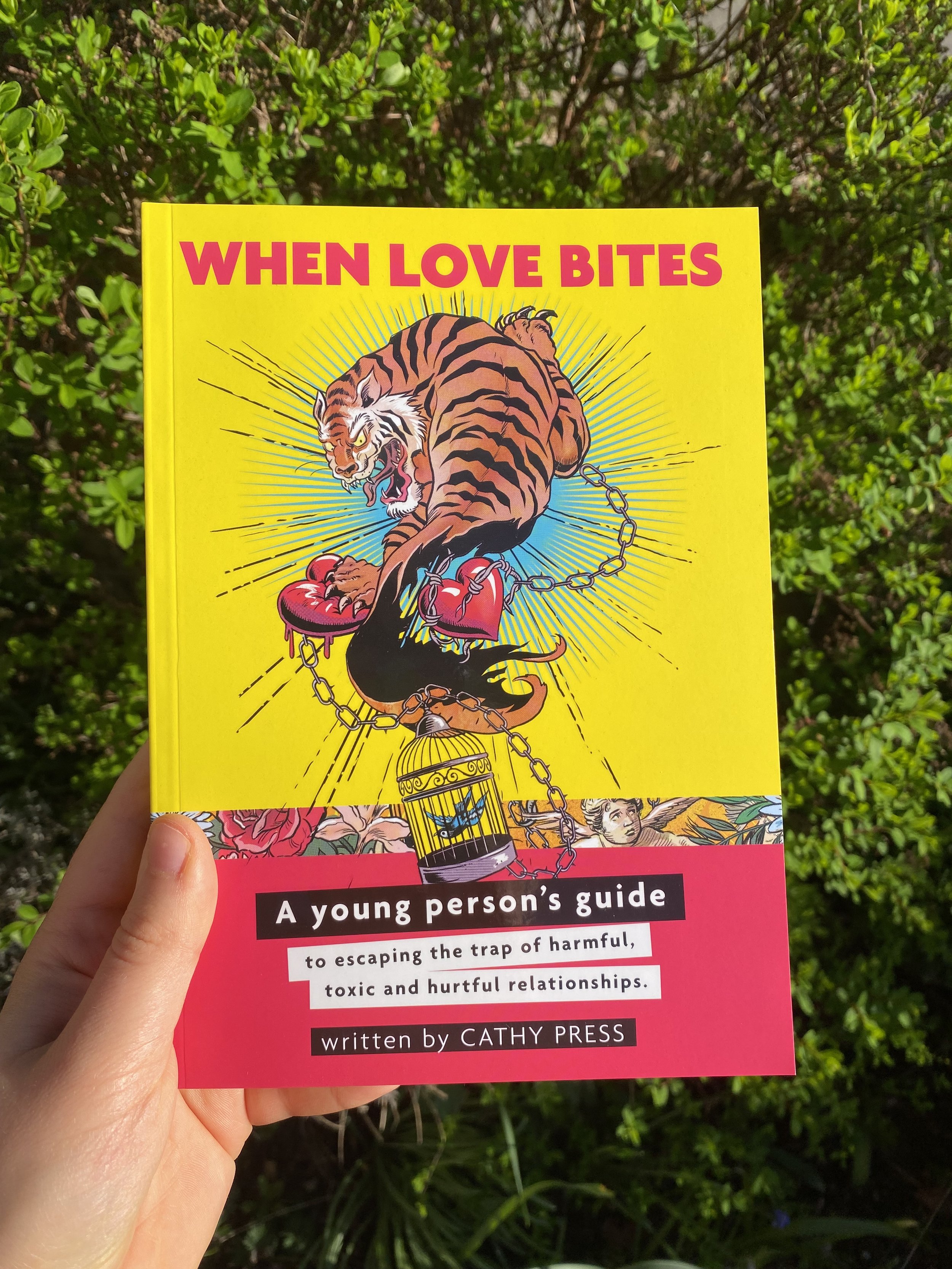Teenage Relationship Abuse Programme
Escape The Trap Programme
An 8-week programme supporting all young people to learn about the dynamics of grooming, coercion, and power and control.
The Basics
-
This eight-week teenage relationship abuse programme can be used in any setting with young people aged 13-25, whether working with groups or one-to-one. It is designed specifically to address the dynamics of teenage relationship abuse, including grooming, coercion, and power and control for young people, however they identify.
-
Escape the Trap facilitator training is ideal for those working in schools, PRU’s, youth settings, youth offending, young people’s support services, health, CYP services, early intervention teams, therapeutic services, LAC services, and social workers, in specialist DV services.
Escape the Trap can be run within any youth provision, including school/college/university, with students, teenage mothers, and young parents. However, some trained facilitators are applying the programme with young people aged 11+ on a 1:1 basis in response to individual need.
-
Escape the Trap consists of eight 90-minute sessions. The programme uses a combination of discussion, exercises, self-reflection, and research to provide part-therapeutic and part-knowledge based education and engagement. The core elements of the programme address:
Week 1 - Introducing the programme and exploring the Ideal Partner
Week 2 - Exploring the Controller, including expectations of intimate relationships and the switching of behaviours and tactics
Week 3 - The Charmer, discussing the experience of grooming and coercive behaviours
Week 4 - The Bully, exploring the behaviours and beliefs of the perpetrators of intimate partner violence
Week 5 - The Mindmixer, exploring emotional abuse and its impacts, including confusion, guilt, and self-blame
Week 6- The Taker, exploring the impact of sexual coercion and abuse
Week 7 - The Keeper, identifying tactics of isolation used by perpetrators
Week 8 - How to Spot the Controller, including how to identify coercive and controlling behaviours early on in new relationships, advice and information on support, and safety planning
-
Ethos and structure of the programme
Understanding the context and dynamics of grooming, coercive control and all forms of abuse within young intimate relationships
One’s own beliefs and understandings of teenage relationship abuse, grooming, sexual coercion and coercive control
Understanding the prevalence of abuse through social media platforms
Deepening reflections on the interactive and experiential activities
Insights into the impact of coercive, controlling and abusive behaviours on the wellbeing and mental health of young people
Identifying additional risk factors and safety planning
Facilitation skills and practical application of programme delivery
How to run the programme flexibly in groups and 1:1
Meeting the needs of young people within a trauma-informed and therapeutic framework
Three Day Facilitator Training
Over the three-day facilitator training, practitioners will gain an understanding of the complex dynamics of teenage relationship abuse, grooming, CSE, sexual coercion and the impact on mental health. Each week of the programme will be explored in depth so practitioners will feel confident and equipped to deliver it at the end of the training.
-
An insight into the context, prevalence and data relating to coercive and controlling behaviours in young intimate relationships. An experiential journey through Weeks 1–2 of the programme, such as introductions and building safety within the group, exploring the ‘ideal’ partner and an overview of the Controller, including ideas and expectations of relationships.
-
An exploration of Weeks 3-5 of the programme, including the Charmer, the Bully, and the Mindmixer. This will include experiential exercises, discussion, active practice of delivery, setting up a group, and insights into the research elements of the programme.
-
Focusing on a deeper insight into the Taker, including the introduction and practice of grounding resources and self-regulatory techniques. Exploring the Keeper through experiential exercises, discussion, active practice of delivery, and how to identify early indicators and misconception of coercive behaviours, safety planning and evaluation.
Our aim is to build the confidence of practitioners to view each week of the programme through the lens of the young people they’re working with, deliver the programme and materials in their own settings and encouraging facilitators to support their young people during the programme and beyond.
On successful completion of the three-day facilitator training, participants will be eligible to run the Escape the Trap programme and will have access to a private area on the Awareness Matters website. Here they can download all the materials needed to run the eight-week programme. There are no further license fees, enabling practitioners to run programmes immediately. It is expected that where possible newly trained facilitators take the opportunity to co-facilitate with an experienced ETT facilitator prior to leading their own group.
Upcoming Training
11th, 12th and 13th May 2026
Delivered online via Zoom
Cost for the online training will be £850 (plus V.A.T.) per person, including the course handouts and access to all the programme materials needed to run the Escape the Trap programme.
It is recommended that practitioners have completed domestic and sexual violence and abuse training and have some experience working with clients and those who are/have experienced domestic abuse or teenage relationship abuse. All practitioners must have completed recognised safeguarding training.
Programme Rationale
Escape the Trap has been developed in response to the rising numbers of young people being vulnerable to coercive control, sexual coercion, and intimate relationship abuse. The statistics on the prevalence of teenage relationship abuse and its impact on the wellbeing and mental health of young people who find themselves victims of such coercion and control are troubling and are not being adequately addressed by education or culture.
Within society, there is a common misapprehension that any person being abused has some understanding of what has happened to them. However, we know this is simply not the case. More commonly, anyone being subjected to abuse feels that they are in the middle of a very confusing mess and that it is somehow their fault.
The programme is specifically designed to help all young people to recognise abusive behaviours and identify the impact of such behaviours on their mental health and emotional well-being. The programme supports them to consider their expectations of relationships and what kind of partner they would like, as well as the kind of partner they would like to be.
Part of the learning about coercive and controlling behaviours and sexual coercion and abuse throughout the programme, will be achieved by exploring gender inequalities and how such inequality impacts and shapes our beliefs, behaviours and barriers to seeking help. This learning will apply equally to the societal expectations of those in heterosexual and LGBTQ+ relationships.
It is widely acknowledged that domestic and sexual violence and abuse is undoubtedly a gender issue, experienced disproportionately by females. However, it is clear, that growing numbers of young people are using coercive and controlling behaviours including sexual coercion in their early relationships, compounded by access to digital technology, social media and porn. This increase effects everyone, regardless of gender identity.
Escape the Trap is designed to work over a 1.5-hour or 2-hour session, as session times will vary group to group, depending on where the group is run (e.g. in school, children’s centres etc.). There are exercises to be completed each week involving working individually, in pairs or as a whole group. The programme has an accompanying workbook and works alongside the book When Love Bites.
Escape the Trap encourages participants to consider how they interpret what is happening to them, the context of their experience, and how such thinking can be re-enforced by the wider community and society at large. The programme also focuses on how being treated with respect, care and love might be experienced. The programme can be delivered in any school, youth setting, children’s centre, youth service or specialist agency by trained, experienced facilitators, in groups or 1:1.
There will be significant differences in the maturity and life experience of each young person doing the programme. The choice of exercises reflects this, ensuring that, as well as the core part of each weekly session, there are a variety of suggested exercises and research designed to support learning. Facilitators can choose exercises to meet the specific needs of the young people in their groups.
When Love Bites
When Love Bites
Have you seen the accompanying book to the Escape the Trap Programme? When Love Bites is a complete guide to navigating teenage relationship abuse. From spotting the signs of controlling behaviour to grounding resources and how to leave, When Love Bites is an accessible, easy-to-read companion to you, your clients, your children, and to the Escape the Trap programme.









